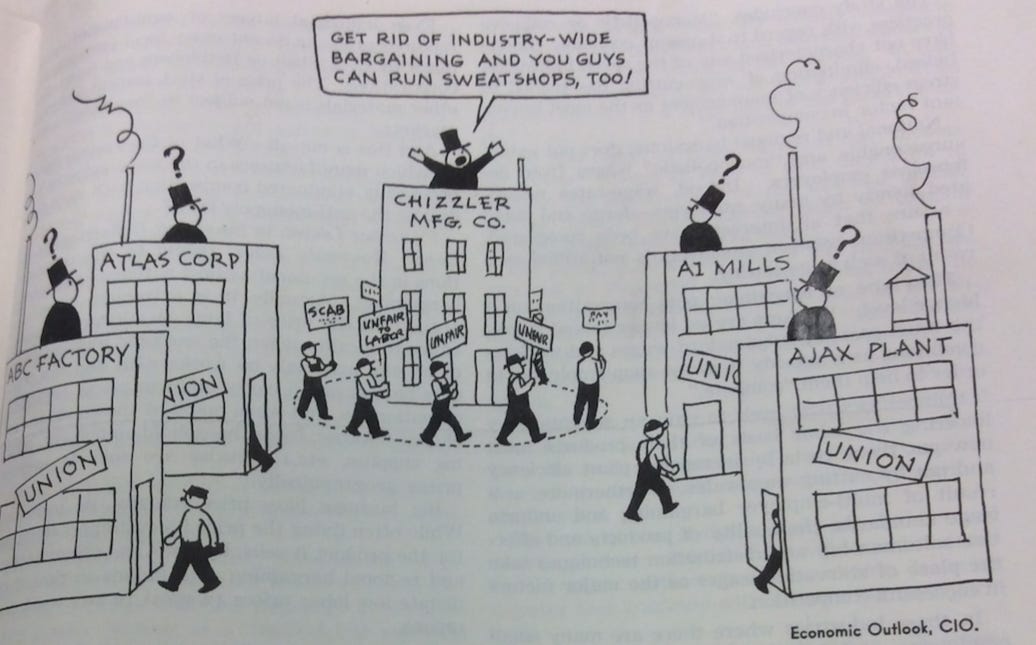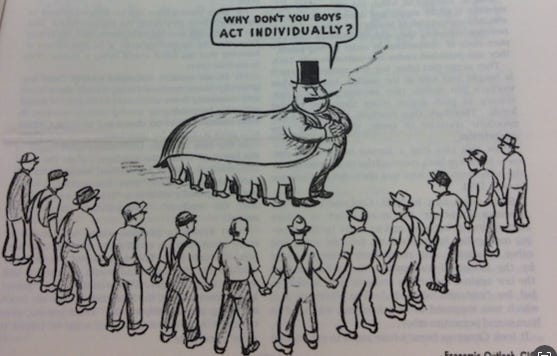Labor's Dual-Track Mind on Mergers
Organized labor is a bedrock of populism, but this week, an important labor leader endorsed the JetBlue-Spirit Airlines merger. So how do unions think about corporate combinations?
Welcome to BIG, a newsletter on the politics of monopoly power. If you’d like to sign up to receive issues over email, you can do so here.

“America is the land of labor.” - Benjamin Franklin, 1782
One bedrock of support for populism in America in the 20th century is organized labor, but there has always been a checkered relationship between unions and a key anti-monopoly tool - antitrust.
And this week, we saw such a dynamic in play in two different cases. Two days ago, Sara Nelson, the leader of the flight attendants union, came out in support of the merger of JetBlue and Spirit Airlines. It was full-throated support, but with a self-aware recognition that mergers have usually not helped her members.
“Our union has experience with eight mergers in the past ten years,” she said. “We agree with skeptics that consolidation has accrued extraordinary power to a few airlines. However, this merger will help to correct that.” Nelson is an immensely creative labor leader, and her political foresight and savvy is in many ways responsible for saving the industry during Covid. So it’s important to take her understanding of leverage quite seriously.
As evidence for why the JetBlue and Spirit combination makes sense, Nelson cited improved wages and working conditions for her members conditioned upon the merger going through. JetBlue, she said, pledged to “increase wages by 10-27 percent immediately” after the merger closes. It also improves working conditions and includes a no furlough arrangement, as well as different and more favorable bargaining arrangements.
These benefits for flight attendants are part of a deal cut in order to offer political support for the combination. Nelson made an additional argument, saying that the merger “adds competition to the airline industry” and fosters “choice and comfort that benefits consumers.” There is little evidence that consolidation in airlines benefits consumers, but Nelson is pushing the arguments of the merging parties so her members get a raise and better working conditions. Fair enough.
Other unions in the airline industry haven’t weighed in, so being positive about this merger is by no means consensus in the labor community. Nevertheless, Nelson’s comments were a striking pro-consolidation statement, especially for someone who has a powerful understanding of the perils of consolidation.
And this argument comes on the heels of the Communications Workers of America encouraging the Federal Trade Commission and European antitrust officials to approve Microsoft’s takeover of Activision, the video game publishing firm. CWA didn’t make an unsupported allegation that the merger was good for consumers, but argued that Microsoft has made pledges to let unions organize Activision, and implied, though did not state outright, that such a pledge should countervail any harm the merger might cause in other areas. Once again, fair enough.
These two examples illustrate one approach, which is to accept more corporate power in return for benefits for members that a union already represents or can more readily organize. Another approach is premised on a deep disdain for monopolization and a recognition that corporate consolidation is a labor problem on its own merits. Last month, for instance, the Service Employees International Union (SEIU) went after hospital giant UPMC in western Pennsylvania, and the NewsGuild has asked the Antitrust Division to block a newspaper deal in Pittsburgh. Local units are speaking out against the Kroger and Albertsons merger.
Hostility to mergers is common, sometimes among the same unions who can be supportive. For instance, CWA, which supports the Microsoft-Activision merger, was one of the main opponents of the Sprint-T-Mobile combination.
Outside of specific mergers, organized labor generally expresses strong support for antitrust action, and for the Federal Trade Commission and Department of Justice to act. Last year, unions like AFSCME, the Writer’s Guild West, the American Federation of Teachers, National Nurses United, the NewsGuild, and CWA itself all encouraged tighter merger guidelines to address what they argued was a crisis of corporate concentration. And it’s no surprise why - mergers often result in layoffs and less bargaining power for workers.
Notably, CWA, in its argument for tighter merger guidelines, said that antitrust law should not allow the kind of countervailing it sought in the Activision merger. (‘A merger that may substantially lessen competition in any relevant market is illegal even if, “on some ultimate reckoning of social or economic debits and credits, it may be deemed beneficial.” United States v. Phila. Nat’l Bank, 374 U.S. 321, 371 (1963).’)
Such inconsistencies are not unusual. Labor unions must represent their members, and if a merger outcome could deliver benefits to workers, it would be foolish for unions not to take that into account. But this tension also goes back to the origin of antitrust law. For the first twenty years of the Sherman Antitrust Act, the law was as useful a sword against organized labor as it was against corporate consolidation. In 1901, the American Federation of Labor attempted to unionize the factory of D. E. Loewe & Company, a hat maker in Danbury, and used a secondary consumer boycott of the company’s products to enforce its organizing attempt. With Loewe v. Lawlor (1908), the Supreme Court used antitrust law to make such boycotts illegal.
The Clayton Act in 1913 restricted the use of antitrust suits against labor unions, and over time, as antitrust came to be used as a tool to take on corporate power, unions saw the value of it. In the late 1930s, as workers created key parts of the middle class by organizing the steel, aluminum and auto industry despite deadly repression of mass labor actions and sit-down strikes, the Antitrust Division under Thurman Arnold brought antitrust actions to bear against the bosses. In the 1940s, political actions against the A&P supermarket chain led to a broader deal where the firm allowed the unionization of its workforce, and then those unions warded off the political movement to get rid of chains altogether. This deal worked; small stores competed on a more level playing field, workers got representation and higher wages, and farmers gained bargaining power through antitrust laws.
In the 1970s, the environment was so hot against the corporate power of Big Oil that the AFL-CIO’s George Meany proposed legislation to break up the majors (which is something smaller Texas oil firms had sought). Asked whether such an antitrust action could potentially lead to nationalization of the oil industry, he said “So be it.”
By the late 1990s, neoliberalism was dominant, and it seemed inevitable that cutting deals to get benefits during a wave of corporate consolidation had to be done. For instance, when Boeing was trying to buy McDonnell Douglas in 1997, a third of Boeing’s workers were on strike. Nevertheless, the Washington Post reported at that the time that “union leaders say they could support a merger if it means a stronger aircraft industry and fewer lost jobs.” The merger went through, and Boeing has been destroying its unions ever since.
What we’ve seen with labor and mergers writ broadly is this dual mind on consolidation. In 2018, CWA was a stalwart opponent of T-Mobile buying Sprint. The year before, the Writers Guild West, which has a strong ideological grounding opposed to monopoly, attacked Disney’s takeover of Fox, noting labor concerns. Sometimes, there are disagreements within unions, such as the central body of the UFCW taking no position on the Kroger-Albertsons merger, but local affiliates opposing it. And sometimes unions trade benefits for members for a long-term loss of power to corporate America. Here’s a list of some of the mergers over the last ten years where this was the case.
Highmark/WPAHS Merger Great News for SEIU HCPA Members and Patients in Western PA!, 2013
The Association of Flight Attendants Adds Full Support to Frontier/Spirit Airlines Merger, 2022
SEIU, 1199NE, and other unions back Lifespan-Care New England merger, 2022
CWA Supports Microsoft’s Proposed Acquisition of Activision-Blizzard, 2022
The Association of Flight Attendants Adds Full Support to jetBlue-Spirit Airlines Merger, 2023
Ultimately, the question of how organized labor works through the problem of monopolies is as yet unresolved. Generally speaking unions are run by people who are suspicious of corporate power, but in a hostile environment with little leverage to engage in collective bargaining, it’s difficult to turn down tangible benefits for broader ideological reasons.
The flight attendant union has experience with eight different destructive mergers. The odds that this latest one will break the trend are not good. That the union considers extracting salary increases for what may be a reduced workforce, or worse conditions for consumers, as the best option speaks volumes about the need to make it easier to organize workers in this country, and to bring a different regulatory model to bear on industries like airlines. With the percentage of private-sector workers empowered by membership in a union at a historic low, passing laws like the Protecting the Right to Organize (PRO) Act - which makes it easier for workers to organize into unions - would boost working Americans’ leverage against corporate power. And certainly, that is one reason that CWA is leading the labor movement’s effort to pass the PRO Act.
Workers should not have to make the choice of trading short-term gains for more harmful consolidation. Right now, however, that is the choice organized workers face. Addressing this policy dilemma is critical going forward.



Can unions negotiate profit sharing through % ownership of shares by the union itself, or is that illegal?
Back when AAI was just getting started Bert Foer and I went to see a group of people at the AFL-CIO to try to get them to make a contribution. We said that they cared most about jobs that would be lost through mergers, while we cared most about the higher prices that often resulted from mergers. We said that while our priorities would not always be identical, our views on mergers should be identical most of the time, so they should give us a contribution. They responded that they liked it when mergers led to monopolies because then they could get higher wages. So of course they did not make AAI a contribution. I wonder how much of labor's sometimes pro-merger attitude today is a cynical hope they'll get a share of the resulting monopoly profits?